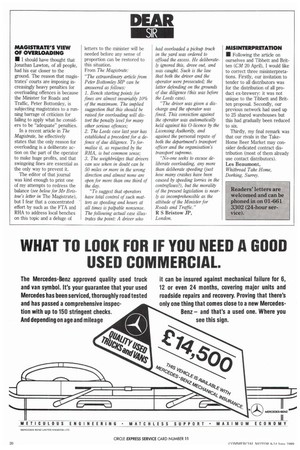MAGISTRATE'S VIEW OF OVERLOADING
Page 22

If you've noticed an error in this article please click here to report it so we can fix it.
• I should have thought that Jonathan Lawton, of all people, had his ear closer to the ground. The reason that magistrates' courts are imposing increasingly heavy penalties for overloading offences is because the Minister for Roads and Traffic, Peter Bottomley, is subjecting magistrates to a running barrage of criticism for failing to apply what he considers to be "adequate" penalties.
In a recent article in The Magistrate, he effectively states that the only reason for overloading is a deliberate action on the part of the operator to make huge profits, and that swingeing fines are essential as the only way to prevent it.
The editor of that journal was kind enough to print one of my attempts to redress the balance (see below for Mr Bristow's letter in The Magistrate), but I fear that a concentrated ' effort by such as the FTA and RHA to address local benches on this topic and a deluge of
letters to the minister will be needed before any sense of proportion can be restored to this situation.
From The Magistrate:
The extraordinary article from Peter Bottomley MP can be answered as follows:
1. Bench starting Points for fines are almost invariably 10% of the maximum. The implied suggestion that this should be raised for overloading will distort the penalty level for many other serious offences; 2. The Leeds case last year has established a precedent for a defence of due diligence. To formalise it, as requested by the RHA, is but common sense; 3. The weighbridges that drivers can use when in doubt can be 50 miles or more in the wrong direction and almost none are open for more than one third of the day.
"To suggest that operators have total control of such matters as speeding and hours at all times is palpable nonsense. The following actual case illustrates the point: A driver who had overloaded a pickup truck in the yard was ordered to offload the excess. He deliberately ignored this, drove out, and was caught. Such is the law that both the driver and the operator were prosecuted; the latter defending on the grounds of due diligence (this was before the Leeds case).
"The driver was given a discharge and the operator was fined. This conviction against the operator was automatically held against his 0-licence by the Licensing Authority, and against the personal repute of both the department's transport officer and the organisation's transport suprenio.
"No-one seeks to excuse deliberate overloading, any more than deliberate speeding (just how many crashes have been caused by speeding lorries in the contra flows?), but the morality of the present legislation is nearly as incomprehensible as the attitude of the Minister for Roads and Traffic."
R S Bristow JP,
London.












































































































































